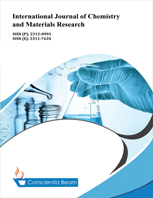Investigation of Usability of Fatty Acids as Copper Extractant from Leached Copper Ore
DOI:
https://doi.org/10.18488/journal.64.2019.71.20.26Abstract
This paper presents an experimental study on leaching and solvent extraction of copper from low-grade copper ore mined from Nasarawa (Nigeria) by fatty acids in petroleum-based diluents - methyl isobutyl ketone (MIBK), styrene, and kerosene. The leaching investigation showed that the optimum temperature, contact time, and H2SO4 concentration are 91.5oC, 39 minutes, and 2.9 M, respectively. Response Surface Methodology (RSM) was adopted for the optimization of the leaching conditions. The aqueous solution obtained from leaching of copper ore in sulfuric acid was used for the solvent extraction. The extraction studies showed that fatty acids in a petroleum-based organic solvent is an effective extractant for solvent extraction of copper. The fatty acids used in the studies were obtained by acidifying the soap that was produced when vegetable oil was treated with sodium hydroxide. It was also observed that diluents affect the percentage extraction of copper. Styrene achieved the highest percentage extraction, followed by kerosene and MIBK at 80 % and 90 % v/v diluents in fatty acids.

